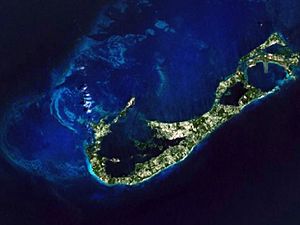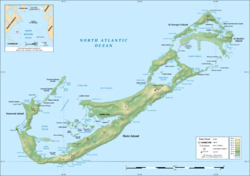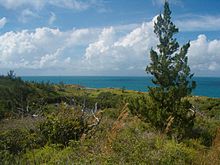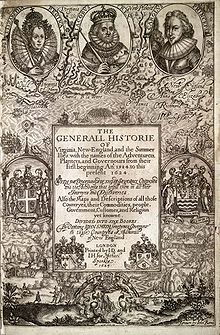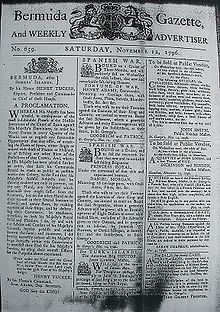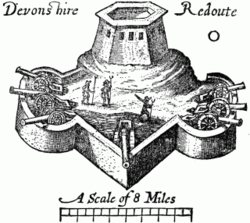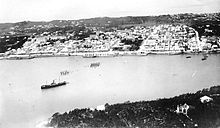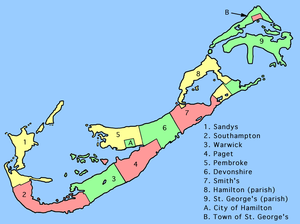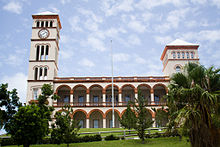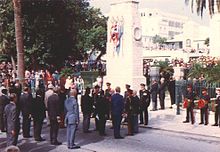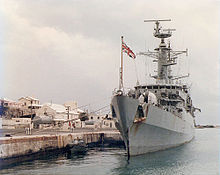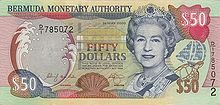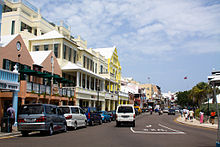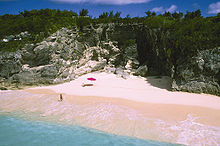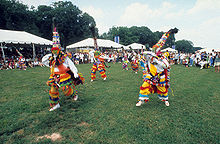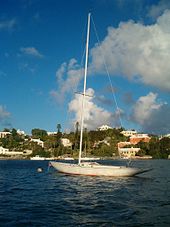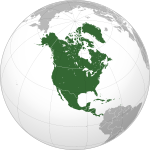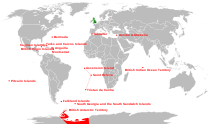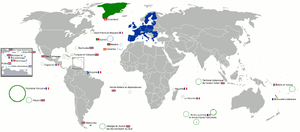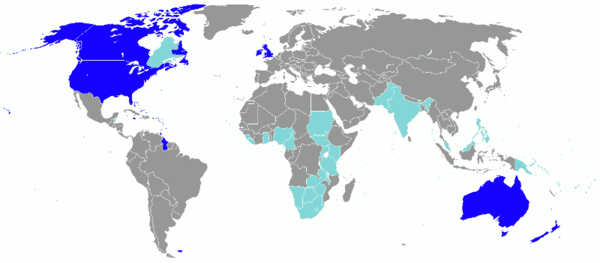- Bermuda
-
This article is about the British overseas territory. For other uses, see Bermuda (disambiguation).
The Bermudas
Somers Isles

Flag Coat of arms Motto: "Quo Fata Ferunt" (Latin)
"Whither the Fates Carry [Us]"Anthem: "God Save the Queen" (official)
"Hail to Bermuda" (unofficial)
Capital Hamilton
32°18′N 64°47′W / 32.3°N 64.783°WLargest municipality
St. George'sOfficial language(s) English 1 Other language Portuguese1 Ethnic groups 54.8% African-Caribbean
34.1% European
6.4% Multiracial
4.3% Other
0.4% Unspecified[1]Demonym Bermudian Government British overseas territories within Constitutional monarchy - Queen Elizabeth II - Governor Sir Richard Gozney - Premier Paula Cox Area - Total 53.2 km2 (221st)
20.6 sq mi- Water (%) 27% Population - 2010 census 64,268 - Density 1,275/km2 (8th)
3,293/sq miGDP (PPP) 2009[2] estimate - Total $5.85 billion[2] (149th) - Per capita $97,000[2] (1st) HDI (2003) n/a (n/a) (n/a) Currency Bermudian dollar2 ( BMD)Time zone Atlantic (UTC-4) ISO 3166 code BM Internet TLD .bm Calling code +1-441 1 According to CIA World Factbook. 2 On par with US$. Bermuda (officially, the Bermudas or Somers Isles) is a British overseas territory in the North Atlantic Ocean. Located off the east coast of the United States, its nearest landmass is Cape Hatteras, North Carolina, about 1,030 kilometres (640 mi) to the west-northwest. It is about 1,373 kilometres (853 mi) south of Halifax, Nova Scotia, Canada, and 1,770 kilometres (1,100 mi) northeast of Miami, Florida. Its capital city is Hamilton.
Bermuda was discovered in 1505 by Spanish navigator Juan de Bermúdez (who claimed to find the island inhabited only by pigs) after whom the islands are named, who claimed it for the Spanish Empire. Unoccupied, the island was settled by Britain in 1609, making it the oldest and most populous remaining British overseas territory. Its first capital, St George's, was established in 1612 and is the oldest continuously inhabited British town in the Americas.[3]
Bermuda had an affluent economy prior to the 2008 financial crisis which saw an exodus of wealth from Bermuda. Bermuda has been plagued with a decline in tourism as the crime rate has increased dramatically. Bermuda's economy prior to the financial crisis was centered on minimal legal regulation and non-taxed global off-shore finance as its largest sector followed by tourism.[3][4] In 2005, Bermuda was once even claimed to have the world's highest GDP per capita, yet these statistics are hard to verify as Bermuda is not classified as a country but rather as a territory of the U.K. It has a subtropical climate.[5] Bermuda makes up the easternmost point of the so-called "Bermuda Triangle," a region of sea in which a number of aircraft and surface vessels have allegedly disappeared under mysterious circumstances.
Contents
Geography
Main article: Geography of BermudaBermuda is located in the North Atlantic Ocean, near the western edge of the Sargasso Sea, roughly 580 nautical miles (1070 km, 670 mi) east-southeast of Cape Hatteras on the Outer Banks of North Carolina and roughly 590 nautical miles (1100 km, 690 mi) southeast of Martha's Vineyard. The island lies due east of Fripp Island, South Carolina. It has 103 km (64 mi) of coastline. There are two incorporated municipalities in Bermuda: the City of Hamilton and the Town of St George. Bermuda is divided into various "parishes," in which there are some localities called "villages," such as Flatts Village and Somerset Village.
Although usually referred to in the singular, the territory consists of 181 islands, with a total area of 53.3 square kilometres (20.6 sq mi). The largest island, Main Island, sometimes itself called Bermuda. Compiling a list of the islands is often complicated, as many have more than one name (as does the entire archipelago, which has also been known historically as La Garza, Virgineola, and the Isle of Devils. 'Somers Isles' is often rendered 'Somers Islands', or mistaken for 'Summer Isles'). Despite its small land mass, there has been a tendency for place names to be repeated; there are, for example, two islands named Long Island, and St George's Town is located on St George's Island within St George's Parish (each known as St George's).
Climate
Main article: Climate of BermudaBermuda has a humid subtropical climate[5][6] on the border of tropical climate. It's warmed by the nearby Gulf Stream, thanks to the westerlies, which carry warm, humid air eastwards over Bermuda, helping to keep winter temperatures above freezing. The climate is humid and, as a result, the summertime heat index can be high, even though mid-August temperatures rarely exceed 30 °C (86 °F). Winters are mild, with average daytime temperatures in January and February around 20 °C (68 °F), although cold fronts bring Arctic air masses that can result in rapid temperature drops. Atlantic winter storms, often associated with these cold fronts, can produce powerful, gusting winds and heavy rain. Factoring in the wind chill, the felt air temperature in winter can fall below freezing, 0 °C (32 °F), even though the actual temperature rarely drops below 10 °C (50 °F). The lowest temperature recorded between 1949 and 1999 was 6.7 °C (44.0 °F), in February 1950.[7]
Bermuda is very susceptible to hurricanes. Its position along the Gulf Stream means that it is often directly in the path of hurricanes recurving in the westerlies, although they have usually begun to weaken as they approach the island. It is often affected by these hurricanes, although the island's small size means that direct landfalls are rare. The last hurricane to cause significant damage to Bermuda was category 3 Hurricane Fabian on 5 September 2003.
The only source of fresh water in Bermuda is rainfall, which is collected on roofs and catchments (or drawn from underground lenses) and stored in tanks. Each dwelling usually has at least one of these tanks forming part of its foundation.
Climate data for Hamilton – capital of Bermuda Month Jan Feb Mar Apr May Jun Jul Aug Sep Oct Nov Dec Year Average high °C (°F) 20.39
(68.70)19.89
(67.80)20.33
(68.59)21.56
(70.81)24.11
(75.40)27.00
(80.60)29.22
(84.60)29.83
(85.69)28.78
(83.80)26.33
(79.39)23.61
(74.50)21.44
(70.59)24.37 Daily mean °C (°F) 18.22
(64.80)17.69
(63.84)18.00
(64.40)19.25
(66.65)22.02
(71.64)24.89
(76.80)26.64
(79.95)27.16
(80.89)26.14
(79.05)23.88
(74.98)21.16
(70.09)18.97
(66.15)22.00 Average low °C (°F) 16.06
(60.91)15.50
(59.90)15.67
(60.21)16.94
(62.49)19.89
(67.80)22.78
(73.00)24.06
(75.31)24.50
(76.10)23.50
(74.30)21.44
(70.59)18.72
(65.70)16.50
(61.70)19.63 Precipitation mm (inches) 128.5
(5.059)115.3
(4.539)110.0
(4.331)87.90
(3.4606)82.80
(3.2598)130.3
(5.13)114.6
(4.512)130.8
(5.15)129.3
(5.091)161.3
(6.35)104.6
(4.118)114.3
(4.5)1,409.7
(55.5)Avg. precipitation days (≥ 0.01 inch) 17 15 15 12 10 12 13 14 15 16 13 17 171 Source: Bermuda Weather Service[8] Climate data for Hamilton – capital of Bermuda Month Jan Feb Mar Apr May Jun Jul Aug Sep Oct Nov Dec Year Average high °C (°F) 20
(68)20
(68)20
(68)21
(70)23
(73)27
(81)29
(84)30
(86)28
(82)26
(79)23
(73)21
(70)24 Daily mean °C (°F) 18
(64)17
(63)18
(64)19
(66)22
(72)25
(77)27
(81)27
(81)26
(79)24
(75)21
(70)19
(66)22 Average low °C (°F) 16
(61)15
(59)15
(59)17
(63)20
(68)22
(72)25
(77)25
(77)24
(75)22
(72)19
(66)17
(63)20 Precipitation mm (inches) 120
(4.72)110
(4.33)100
(3.94)80
(3.15)70
(2.76)120
(4.72)110
(4.33)120
(4.72)120
(4.72)160
(6.3)100
(3.94)110
(4.33)1,400
(55.12)Source: Weatherbase[9] Flora and fauna
Main article: Flora and fauna in BermudaWhen discovered, Bermuda was dominated by forests of the Bermuda cedar (Juniperus bermudiana), with mangrove swamps along its shores. Only 165 of the island's current 1000 vascular plant species are considered native, and of those 15, including the cedar, are endemic.
The only indigenous mammals of Bermuda are five species of bats, all of which also occur in the eastern United States—Lasionycteris noctivagans, Lasiurus borealis, Lasiurus cinereus, Lasiurus seminolus, and Perimyotis subflavus.[10] Other commonly known fauna of Bermuda includes its national bird, the Bermuda Petrel, and the Bermuda Rock Skink. The skink was long thought to have been the only indigenous land vertebrate of Bermuda, discounting the marine turtles that lay their eggs on its beaches. It has recently been discovered, however, that a species of terrapin, which had been assumed to have been introduced, predated the arrival of humans on the archipelago. As this species spends most of its time in brackish ponds, there is some question as to whether it negates the skink's claim to be the only indigenous land vertebrate.
History
Main article: History of BermudaPre-settlement
Bermuda was discovered in 1505 by Spanish explorer Juan de Bermudez.[11] It is mentioned in Legatio Babylonica, published in 1511 by historian Pedro Mártir de Anglería, and was also included on Spanish charts of that year. Both Spanish and Portuguese ships used the islands as a replenishment spot for fresh meat and water, but legends of spirits and devils, now thought to have stemmed only from the callings of raucous birds (most likely the Bermuda Petrel, or Cahow), also the loud noise heard at night from wild hogs and of perpetual, storm-wracked conditions (most early visitors arrived under such conditions) and a surrounding ring of treacherous reefs, kept them from attempting any permanent settlement on the Isle of Devils.
Settlement by the English
For the next century, the island is believed to have been visited frequently but not permanently settled. The first two English colonies in Virginia had failed, and a more determined effort was initiated by King James I of England (James VI of Scotland), who granted a Royal Charter to the Virginia Company. In 1609, a flotilla of ships left England under the Company's Admiral, Sir George Somers, and the new Governor of Jamestown, Sir Thomas Gates, to relieve the colony of Jamestown, settled two years before. Somers had previous experience sailing with both Sir Francis Drake and Sir Walter Raleigh. The flotilla was broken up by a storm, and the flagship, the Sea Venture, was wrecked off Bermuda (as depicted on the territory's coat of arms), leaving the survivors in possession of a new territory. (William Shakespeare's play The Tempest is thought to have been inspired by William Strachey's account of this shipwreck.) [12] The island was claimed for the English Crown, and the charter of the Virginia Company was extended to include it.
Most of the survivors of the Sea Venture had carried on to Jamestown in 1610 aboard two Bermuda-built ships. Among them was John Rolfe, who left a wife (Sarah Hacker) and child buried in Bermuda, but in Jamestown, married Pocahontas, a daughter of Powhatan. Intentional settlement of Bermuda began with the arrival of the Plough, in 1612. St George's was settled in 1612 and made Bermuda's first capital. It is the oldest continually inhabited English town in the New World.[3]
In 1615, the colony was passed to a new company, the Somers Isles Company (The Somers Isles remains an official name for the colony, named after Admiral Somers, just as Gate's Bay and Fort Gates are named after Sir Thomas Gates), formed by the same shareholders. The close ties with Virginia were commemorated even after Bermuda's separation by reference to the archipelago in many Virginian place names, such as Bermuda City, and Bermuda Hundred. The first British coins in America were struck here.
Company colony
Because of its limited land area, Bermuda has had difficulty with over-population. In the first two centuries of settlement it relied on steady human emigration to keep the population manageable. It is often claimed that, before the American Revolution more than ten thousand Bermudians (over half of the population) emigrated, primarily to the American South, where Great Britain was displacing Spain as the dominant European imperial power. A steady trickle of outward migration continued. With seafaring being the only real industry, by the end of the 18th century at least a third of the island's manpower was at sea at any one time.
The archipelago's limited land area and resources led to the creation of what may be the earliest conservation laws of the New World. In 1616 and 1620 acts were passed banning the hunting of certain birds and young tortoises.[13]
In 1649, the English Civil War raged and King Charles I was beheaded in Whitehall, London. The execution resulted in the outbreak of a Bermudian civil war; it was ended by militias. This created a strong sense of devotion to the crown for the majority of colonists and it forced those who did not swear allegiance, such as Puritans and independents, into exile in the Bahamas.[14]
In the 17th century the Somers Isles Company suppressed shipbuilding, as it needed Bermudians to farm in order to generate income from the land. Agricultural production met with only limited success, however. The Bermuda cedar boxes used to ship tobacco to England were reportedly worth more than their contents.[citation needed] The colony of Virginia far surpassed Bermuda in both quality and quantity of tobacco produced. Bermudians began to turn to maritime trades relatively early in the 17th century, but the Somers Isles Company used all its authority to suppress turning away from agriculture. This interference led to the islanders demanding, and receiving, the revocation of the Company's charter in 1684; the Company itself being dissolved.
Maritime economy
After the dissolution of the Somers Isle Company, Bermudians rapidly abandoned agriculture for shipbuilding, replanting farmland with the native juniper (Juniperus bermudiana, called Bermuda cedar) trees that grew thickly over the whole island. Establishing effective control over the Turks Islands, Bermudians deforested their landscape to begin the salt trade that became the world's largest and remained the cornerstone of Bermuda's economy for the next century. Bermudian sailors relied on more than salt, however. They vigorously pursued whaling, privateering, and the merchant trade. Vessels sailed the normal shipping routes, but were required to engage an enemy vessel no matter the size or strength, and as a result many ships were destroyed. The Bermuda sloop became highly regarded for speed and maneuverability. The Bermuda sloop HMS Pickle, one of the fastest vessels in the Royal Navy, brought the news of the victory at Trafalgar and the death of Admiral Nelson back to England.
Fortress Bermuda
After the American Revolution, the Royal Navy began improving the harbours and in 1811 started building the large dockyard on Ireland Island, in the west of the chain, to serve as its principal naval base guarding the western Atlantic Ocean shipping lanes. During the War of 1812 between Britain and the United States, the British attacks on Washington, D.C. and the Chesapeake (which prompted the writing of The Star-Spangled Banner) were planned and launched from Bermuda where the headquarters of the Royal Navy's 'North American Station' had recently been moved from Halifax, Nova Scotia.
 The First Bermuda Volunteer Rifle Corps Contingent, raised in 1914. By the war's end, the two Bermuda contingents had lost over 75% of their combined strength.
The First Bermuda Volunteer Rifle Corps Contingent, raised in 1914. By the war's end, the two Bermuda contingents had lost over 75% of their combined strength.
It was here that the British soldiers assembled before being sent to attack Baltimore and Washington. In 1816, James Arnold, the son of Benedict Arnold, fortified Bermuda's Royal Naval Dockyard against possible U.S. attacks.[15] Today, the "Maritime Museum" occupies the Keep of the Royal Naval Dockyard, including the Commissioner's House, and exhibits artefacts of the base's military history.
As a result of Bermuda's proximity to the southeastern U.S. coast, it was regularly used by Confederate States blockade runners during the American Civil War to evade Union naval vessels and bring desperately needed war goods to the South from England. The old Globe Hotel in St George's, which was a centre of intrigue for Confederate agents, is preserved as a museum open to the public.
Economic and political development
In the early 20th century, as modern transport and communication systems developed, Bermuda became a popular destination for wealthy American, Canadian and British tourists arriving by frequent steamship service. In addition, the Smoot-Hawley Tariff Act enacted by the United States against its trading partners in 1930, cut off Bermuda's once-thriving agricultural export trade (primarily lilies and fresh vegetables to the U.S.), spurring the overseas territory to develop its tourist industry.
After several failed attempts, in 1930 the first aeroplane reached Bermuda. A Stinson Detroiter seaplane flying from New York, it had to land in the ocean once because of darkness and then again to refuel. Navigation and weather forecasting improved in 1933 when the Royal Air Force established a station at Bermuda and operated float planes from the harbour in coordination with the British fleet. In 1936 Luft Hansa began to experiment with seaplane flights from Berlin via the Azores with continuation to New York City.[16] In the late 1930s, Imperial Airways and Pan American World Airways began operating scheduled flying-boat airline services from New York and Baltimore to Darrell's Island, Bermuda. In 1948, regularly scheduled commercial airline service by land-based aeroplanes began to Kindley Field (now L.F. Wade International Airport), helping tourism to reach its peak in the 1960s–1970s. By the end of the 20th century, international business had supplanted tourism as the dominant sector of Bermuda's economy (see Economy of Bermuda).
The Royal Naval Dockyard, and the attendant military garrison continued to be an important component of Bermuda's economy until the mid-20th century. In addition to considerable building work, the armed forces needed to source food and other materials from local vendors. Beginning in World War II, U.S. military installations also were located in Bermuda (see "Military" section, below, and Military of Bermuda).
Universal adult suffrage and the development of a two-party political system occurred in the 1960s. Before universal suffrage, adopted as part of Bermuda's Constitution in 1967, voting was based on property ownership (see "Politics" section, below, and Politics of Bermuda). On 10 March 1973, then-Governor of Bermuda Richard Sharples was assassinated by local Black Power militants during a period of civil unrest in the 1970s.
Parishes and municipalities
Main article: Administrative divisions of BermudaBermuda is divided into nine parishes and two municipalities.
Bermuda's nine parishes:
Bermuda's two incorporated municipalities:
Bermuda's two informal villages:
Despite their names, Jones Village (in Warwick), Cashew City (St. George's), Claytown (Hamilton), Middle Town (Pembroke) and Tucker's Town (St. George's) are merely neighborhoods; Dandy Town and North Village are sports clubs and Harbour View Village is a small public housing development.
Politics
Main article: Politics of BermudaExecutive authority in Bermuda is vested in the monarch and is exercised on her behalf by the Governor. The governor is appointed by the Queen on the advice of the British Government. The current governor is Sir Richard Hugh Turton Gozney KCMG CVO; he was sworn in on 12 December 2007.[17] There is also a Deputy Governor (currently David ArkleyJP).[18] Defence and foreign affairs remain the responsibility of the United Kingdom, which also retains responsibility to ensure good government. It must approve any changes to the Constitution of Bermuda. Bermuda now exists as an overseas territory of Britain, but it is the oldest British colony. In 1620, a Royal Assent granted Bermuda limited self-governance, thus making the Parliament of Bermuda the fifth oldest in the world, behind only the Parliament of the United Kingdom, the Tynwald of the Isle of Man, the Althing of Iceland and Sejm of the Republic of Poland.[19] Of these, it is the only one to have met continuously as a legislature since its inception through to today.
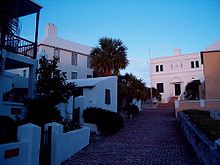 The State House, the home of Bermuda's parliament 1620–1815
The State House, the home of Bermuda's parliament 1620–1815
The Constitution of Bermuda came into force on 1 June 1967 and was amended in 1989 and 2003. The head of government is the premier. A cabinet is nominated by the premier and appointed officially by the governor. The legislative branch consists of a bicameral parliament modelled on the Westminster system. The Senate is the upper house consisting of 11 members appointed by the governor on the advice of the premier and the leader of the opposition. The House of Assembly, or lower house, has 36 members elected by the eligible voting populace in secret ballot to represent geographically defined constituencies. Elections must be called at no more than five-year intervals. The Progressive Labour Party won the most recent general election held on 18 December 2007, winning 22 of 36 seats in the House of Assembly.[20]
Following her victory at the Progressive Labour Party delegates' conference in October 2010, the current premier is Paula Cox. The One Bermuda Alliance serves in opposition. The Progressive Labour Party leadership favours independence from the United Kingdom, although polls have indicated that this is not supported by the population. While a referendum in 1995 on independence was defeated by a substantial margin, the Bermuda Industrial Union and the Progressive Labour Party (then in the Opposition) had called for a boycott of the referendum, having an unquantified impact on the result.
There are few accredited diplomats in Bermuda. The United States maintains the largest diplomatic mission in Bermuda, comprising both the United States Consulate and the U.S. Customs and Border Protection Services at the L.F. Wade International Airport. The current U.S. Consul General is Grace Shelton, who replaced Gregory W. Slayton as the U.S. Chief of Mission in Bermuda in August 2009. Given that the United States is by far Bermuda's largest trading partner (providing over 71% of total imports, 85% of tourist visitors, and an estimated $163 billion of U.S. capital in the Bermuda insurance/re-insurance industry alone, and the fact that an estimated 5% of Bermuda residents are U.S. citizens, which represents 14% of all foreign-born persons), American diplomatic presence is seen as an important element in the Bermuda political landscape.
A General Election must be held in Bermuda every five years. Following the PLP's re-election in 2007, the next election must be held no later than 2012.
Role in international relations
As a British Overseas Territory, Bermuda has no seat in the United Nations and is represented by Britain in matters of foreign affairs. To promote its economic interests abroad Bermuda maintains representative offices in key influential cities such as London[21] and Washington D.C..[22]
Bermuda's proximity to the United States has made it the site of past summit conferences between British Prime Ministers and U.S. Presidents. The first summit was held in December 1953, at the insistence of Prime Minister Winston Churchill, to discuss relations with the Soviet Union during the Cold War. Participants at the conference included Churchill, U.S. President Dwight D. Eisenhower and French Premier Joseph Laniel. In 1957, a second summit conference was held; this time British Prime Minister Harold Macmillan arrived earlier than President Eisenhower, to make it clear that they were meeting on British territory, as tensions were still high regarding the previous year's conflict over the Suez Canal. It was said the two discussed the general situation of the world. Macmillan returned in 1961 for the third summit with President John F. Kennedy, who was familiar with Bermuda, having made numerous personal visits. The meeting was called to discuss Cold War tensions arising from construction of the Berlin Wall. The most recent summit conference in Bermuda between the two powers occurred in 1990, when British Prime Minister Margaret Thatcher met U.S. President George Bush.[23]
Direct meetings between the President of the United States and the Premier of Bermuda have been rare. The most recent meeting was on 23 June 2008, between Premier Ewart Brown and President George W. Bush. Prior to this, the leaders of Bermuda and the United States had not met at the White House since a 1996 meeting between Premier David Saul and President Bill Clinton.[24]
Asylum offered to four former Guantánamo detainees
Main article: Uyghur detainees in Guantanamo #BermudaOn 11 June 2009, four Uyghurs who had been held in extrajudicial detention in the United States Guantánamo Bay detention camp, in Cuba were deported to Bermuda.[25][26][27][28] The four men were among 22 Uyghurs who claimed to be refugees, who were captured in 2001 in Pakistan after fleeing the American aerial bombardment of Afghanistan. They were suspected of training to assist Taliban's military. They were cleared as safe for release from Guantánamo in 2005 or 2006. But U.S. domestic law prohibited deporting them back to China, their country of citizenship, because the U.S. government determined that China was likely to abuse their human rights.
In September 2008 the men were cleared of all suspicion, and Judge Ricardo Urbina in Washington ordered their release. However domestic opposition to their admittance to the United States was very strong,[citation needed] and, until Bermuda and Palau agreed to accept them in June 2009, the U.S. had failed to find a home for them.
The secret bilateral discussions that led to prisoner transfers between the U.S. and the devolved Bermuda government sparked diplomatic ire from the United Kingdom, which was not consulted on the move despite Bermuda being a British territory. The British Foreign Office issued the following statement: "We've underlined to the Bermuda Government that they should have consulted with the United Kingdom as to whether this falls within their competence or is a security issue, for which the Bermuda Government do not have delegated responsibility. We have made clear to the Bermuda Government the need for a security assessment, which we are now helping them to carry out, and we will decide on further steps as appropriate."
Caribbean Community
Despite its location well north of the Caribbean, Bermuda became an associate member of the Caribbean Community (CARICOM) in 2003 .[29][30] This is a socio-economic bloc of nations in the Caribbean, or near the Caribbean—such as the Co-operative Republic of Guyana, the Republic of Suriname, and Belize in Central America as full members. Bermuda[31] and the Turks and Caicos Islands which are in the Atlantic Ocean as Associate members of CARICOM, and the same goes for the Commonwealth of The Bahamas which is a full member of the Caribbean Community and also in the Atlantic. Among scholars[who?], “the Caribbean” can be a socio-historical category, commonly referring to a cultural zone characterised by the legacy of slavery and the plantation system. It embraces the islands and parts of the adjoining mainland—and may be extended to include the Caribbean Diaspora overseas.[32]
Armed forces
Main article: Military of BermudaOnce known as the Gibraltar of the West, the defence of Bermuda remains the responsibility of the British government. After the American Revolutionary War, Bermuda became the Royal Navy's Western Atlantic headquarters, before which the Bermuda government had maintained militia for the defence of the colony. Once the Royal Navy established a base and dockyard defended by regular soldiers, however, these militias became superfluous and were disbanded following the War of 1812. At the end of the 19th century, the colony did raise volunteer units to form a reserve for the military garrison.
Due to its strategic location in the North Atlantic Ocean, Bermuda was vital to the Allies' war effort during both world wars of the 20th century, serving as a marshalling point for trans-Atlantic convoys, as well as a naval and air base (during the Second World War).
In May 1940, the U.S. requested base rights in Bermuda from the United Kingdom, but British Prime Minister Winston Churchill was initially unwilling to accede to the American request without getting something in return.[33] In September 1940, as part of the Destroyers for Bases Agreement, the United Kingdom granted the U.S. base rights in Bermuda. Bermuda and Newfoundland were not originally included in the agreement, but both were added to it, with no war material received in exchange. However, one of the terms of the agreement was that the airfield the U.S. Army built would be used jointly by the U.S. and the U.K. (which it was for the duration of the war, with RAF Transport Command relocating there from Darrell's Island in 1943). Construction began in 1941 of two airbases consisting of 5.8 km² (2¼ sq mi, 1,400 acres) of land, largely reclaimed from the sea. For many years, Bermuda's bases were used by U.S. Air Force transport and refuelling aircraft and by U.S. Navy aircraft patrolling the Atlantic for enemy submarines, first German and, later, Soviet. The principal installation, Kindley Air Force Base on the eastern coast, was transferred to the U.S. Navy in 1970 and redesignated Naval Air Station Bermuda. As a naval air station, the base continued to host both transient and deployed USN and USAF aircraft, as well as transitioning or deployed Royal Air Force and Canadian Forces aircraft.
The original NAS Bermuda on the west side of the island, a seaplane base until the mid-1960s, became the Naval Air Station Bermuda Annex and provided optional anchorage and/or dockage facilities for transiting U.S. Navy, U.S. Coast Guard and NATO vessels, depending on size.. An additional U.S. Navy compound known as Naval Facility Bermuda (NAVFAC Bermuda), a SOSUS station, was located to the west of the Annex near a Canadian Forces communications facility. Although leased for 99 years, U.S. forces withdrew in 1995, as part of the wave of base closures following the end of the Cold War.
Canada, which had operated a war-time naval base, HMCS Somers Isles, on the old Royal Navy base at Convict Bay, St George's, also established a radio-listening post at Daniel's Head, in the West End of the islands during this time.
In the 1950s, after the end of World War II, the Royal Naval dockyard and the military garrison were closed. A small Royal Navy supply base, HMS Malabar, continued to operate within the dockyard area, supporting transiting Royal Navy ships and submarines until it, too, was closed in 1995, along with the American and Canadian bases.
In both World War I and World War II, Bermudians served in the British armed forces. Amongst the latter was Major-General Glyn Charles Anglim Gilbert, Bermuda's highest ranking soldier. After the war, he was instrumental in developing the Bermuda Regiment. A number of other Bermudians and children of Bermudians had preceded him into senior ranks, including Bahamian-born Admiral Lord Gambier, and Bermudian-born Royal Marines Brigadier Harvey, who, when promoted to that rank at age 39, following his wounding at the Anzio landings, became the youngest-ever Royal Marine Brigadier. The Cenotaph in front of the Cabinet Building (in Hamilton) was erected in tribute to Bermuda's Great War dead (the tribute was later extended to Bermuda's Second World War dead) and is the site of the annual Remembrance Day commemoration.
Today, the only military unit remaining in Bermuda is the Bermuda Regiment, an amalgam of the voluntary units originally formed toward the end of the 19th century. Although the Regiment's predecessors were voluntary units, the modern body is formed primarily by conscription in which balloted males are required to serve for three years, two months part time, once they turn 18.
Economy
Main article: Economy of BermudaSince switching from the Bermudian pound in 1970, Bermuda's currency has been the Bermudian dollar, which is pegged to the US dollar. US notes and coins are used interchangeably with Bermudian notes and coins within the islands for most practical purposes; however, banks levy a small exchange rate for the purchase of US dollars with Bermudian dollars.[34] Bermudian notes carry the image of HM Queen Elizabeth II. The Bermuda Monetary Authority is the issuing authority for all banknotes and coins, as well as being responsible for the regulation of financial institutions. There is a permanent exhibition of Bermuda notes and coins at the Royal Naval Dockyard Museum.
According to the Bermuda Government's Economic Statistics Division, Bermuda's GDP was $5.85 billion in 2007, or $91,477 per-capita, giving Bermuda the highest GDP per capita in the world.[2] According to the Bermuda Stock Exchange in 2009 Bermuda the median per capita income is much lower as these statistics represent a small number of high earners and its "public debt ratios still compare quite favourably with those of €˜AA' peers".[citation needed]
The affordability of housing has become a prominent issue over the past few years. The CIA World Factbook lists the average cost of a house in June 2003 as $976,000,[1] while real estate agencies have claimed that this figure had risen to $1.6 million by 2006 but has significantly been devalued since the financial crisis as large percentage of foreigners have left Bermuda for Switzerland as well as other tax havens,[35] and to $1.845 million by early 2007,[36] though such high figures have been disputed.[37]
Bermuda is an offshore financial centre, which results from its low direct taxation on personal or corporate income. The local tax system is based upon import duties, payroll taxes and consumption taxes. The legal system is derived from that of the United Kingdom, with recourse to English courts of final appeal. However, foreign private individuals cannot easily open bank accounts or subscribe to mobile phone or internet service.
As the offshore domicile of many foreign companies, Bermuda has a highly developed international business economy; it is a financial exporter of financial services, primarily insurance, reinsurance, investment funds and special purpose vehicles (SPV). Finance and international business now constitute the largest sector of Bermuda's economy.[3] However in September 2009, it was reported that a growing number of companies were moving from Bermuda to Ireland as part of a search for "a more stable environment".[38]
Large numbers of leading international insurance companies are based in Bermuda, making the territory one of the world's largest reinsurance centres.[39] Those internationally owned and operated businesses that are physically based in Bermuda—of which there are around four hundred—are represented by the Association of Bermuda International Companies (ABIC). In total, over 1,500 exempted or international companies are currently registered with the Registrar of Companies in Bermuda.
Thanks to its favourable tax regime and a highly reactive regulatory framework Bermuda is the domicile of choice for the implementation of insurance-related innovative solutions also known as Alternative Risk Transfer (ART). ART includes captive insurances, Finite Risk insurance and insurance securitisation such as Cat bonds.
The Bermuda Stock Exchange (BSX), established in 1971, is now the world's largest fully electronic offshore securities market, with a current market capitalisation (excluding mutual funds) in excess of US$330 billion[citation needed]. There are four hundred securities listed on the stock exchange, of which almost three hundred are offshore funds and alternative investment structures attracted by Bermuda's regulatory environment. The Exchange specialises in listing and trading of capital market instruments such as equities, debt issues, funds (including hedge fund structures) and depository receipt programmes.
The BSX is a full member of the World Federation of Exchanges and is located in an OECD member nation. It also has Approved Stock Exchange status under Australia's Foreign Investment Fund (FIF) taxation rules and Designated Investment Exchange status by the UK's Financial Services Authority.
Tourism is Bermuda's second largest industry, with the island attracting over one-half million visitors annually, of whom more than 80% are from the United States. Other significant sources of visitors are from Canada and the United Kingdom. Tourists arrive either by cruise ship or by air at L.F. Wade International Airport, the only airport on the island.[40]
Education
The Bermuda Education Act 1996 requires that only three categories of schools can operate in the Bermuda Education system:
- aided school, has all or a part of its property vested in a body of trustees or board of governors and is partially maintained by public funding or, since 1965 and the desegregation of schools, has received a grant-in-aid out of public funds.
- maintained school, has the whole of its property belonging to the Government and is fully maintained by public funds.
- private school, not maintained by public funds and has not, since 1965 and the desegregation of schools, received any capital grant-in-aid out of public funds. The private school sector consists of 6 traditional private schools, two of which are religious schools, and the remaining four are secular with one of these being a single gender school and another a Montessori school. Also, within the private sector there are a number of home schools which must be registered with the government and receive minimal government regulation. The only boys’ school opened its doors to girls in the 1990s and in 1996, one of the maintained public schools became a private school.
Prior to 1965, the Bermuda school system was racially segregated and when the desegregation of schools was enacted in 1965, two of the formally maintained "white" schools and both single-sex schools opted to become private schools. The rest became part of the public school system and were either aided or maintained.
At present there are 26 schools in the Bermuda Public School System, 18 of which are primary schools, five are middle schools, two senior schools and one special school. There is also an Alternative Programme provided for students with behavioural challenges who cannot function in the public mainstream. There are two aided primary schools, two aided middle schools and one aided senior school.
For higher education, the Bermuda College offers various associate degrees and other certificate programmes.[41] Bermuda does not have any four-year colleges or universities.
In May 2009, Bermudian Government's application was approved to become a contributory member of the University of the West Indies (UWI). Bermuda's membership is slated to allow Bermudian students to enter the University at an agreed upon subsidised rate possibly as early as the 2009/2010 school year. UWI also agrees that their Open Campus (online degree courses) would become open to Bermudian students in the future, with Bermuda becoming the 13th country to have access to the Open Campus.[42][43]
Main sights
Bermuda's pink sand beaches and clear, cerulean blue ocean waters are popular with tourists and many of Bermuda's hotels are located along the south shore of the island. In addition to its beaches, there are a number of sightseeing attractions. Historic St George's is a designated World Heritage Site. Scuba divers can explore numerous wrecks and coral reefs in relatively shallow water (typically 30–40 ft/9–12 m in depth) with virtually unlimited visibility. Many nearby reefs are readily accessible from shore by snorkellers, especially at Church Bay.
Bermuda's most popular visitor attraction is the Royal Naval Dockyard, which includes the Bermuda Maritime Museum. Other attractions include the Bermuda Aquarium, Museum and Zoo,[44] Bermuda Underwater Exploration Institute, the Botanical Gardens, lighthouses, and the Crystal Caves with its impressive stalactites and underground saltwater pools.
It is not possible to rent a car on the island; however, visitors can hire scooters for use as private transport, or use public transport.
Arts and culture
Main article: Culture of BermudaBermuda's culture is a mixture of the various sources of its population, though little trace remains of the various African slaves, Spanish-Caribbean, Irish, or Scots cultures evident in the 17th century, with Anglo-Saxon culture becoming dominant. Today, the only language other than English that is spoken by any substantial part of the population is Portuguese, following one hundred and sixty years of immigration from Portuguese Atlantic islands (primarily the Azores, though also from Madeira and the Cape Verde Islands). There are strong British influences, together with Afro-Caribbean. A second wave of immigration from the West Indies was sustained throughout the 20th century, although, unlike the Africans who immigrated to that area as indentured servants (or who were imported as slaves) in the 17th century, the more recent arrivals have mostly come from English speaking countries (albeit, most of the West Indian islands whose populations now speak English were then part of the Spanish Empire). This new infusion of West Indians has both accelerated social and political change, and diversified Bermuda's culture. West Indian musicians introduced Calypso music when Bermuda's tourist industry was expanded with the increase of visitors brought by post Second World War aviation. While Calypso music appealed more to the visitors than to the locals, Reggae has been embraced since the 1970s with the influx of Jamaican immigration.
Bermuda's early literary history was largely limited to non-Bermudian writers commenting on the island. These included John Smith's The Generall Historie of Virginia, New-England, and the Summer Isles (1624), and Edmund Waller's poem, Battle of the Summer Islands (1645).[45][46]
In the 20th century, a large number of books were written and published locally, though few were aimed at a wider market than Bermuda (most of these being scholarly reference books, rather than creative writing). One Bermudian novelist, Brian Burland, has achieved a degree of success and acclaim internationally, although the first (and undoubtedly the most important, historically) notable book credited to a Bermudian was the History of Mary Prince, a slave narrative by a Bermudian woman, Mary Prince, which helped to end slavery in the British Empire. Bermuda's proximity to the United States means that many aspects of US culture are reflected or incorporated into Bermudian culture. Many non-Bermudian writers have also made Bermuda their home, or have had homes here, including A.J. Cronin and F. Van Wyck Mason, who wrote on Bermudian subjects.
Bermuda has produced, or been home, to actors (such as Earl Cameron, Diana Dill, Lena Headey, Will Kempe, and most famously, Michael Douglas and Catherine Zeta-Jones).
music and dance are important in Bermuda. Noted musicians have included local icons The Talbot Brothers, who performed for many decades in both Bermuda and The United States (and appearing on Ed Sullivan's televised variety show), jazz pianist Lance Hayward, singer-songwriter Heather Nova, tenor Gary Burgess, classical musician and conductor Kenneth Amis and more recently dancehall artist Collie Buddz.
The dances of the colourful Gombey Dancers, seen at many events, are heavily influenced by African, Caribbean, Native American and British cultural traditions.
In 1979, Gina Swainson was crowned "Miss World".
Every year Bermuda hosts an international film festival, which shows many independent films. One of the festival's founders is film producer and director Arthur Rankin, Jr., co-founder of the Rankin/Bass production company.[47]
Bermuda water colours painted by local artists are sold at various galleries and elaborately hand-carved cedar sculptures are another speciality. One such 7 ft (2.1 m) sculpture created by Bermudian artisan Chesley Trott is on display at the airport's baggage claim area. Local artwork may also be viewed at several galleries around the island. Alfred Birdsey was one of the more famous and talented water colourists, his impressionistic landscapes of Hamilton, St George's and the surrounding sailboats, homes, and bays of Bermuda are world-renowned.
Every Good Friday, Bermudians of all ages build kites, usually of a traditional Bermudian type, which are flown to symbolise Christ's ascent. A Bermudian kite is made to geometric designs, quite colourful, and is an art form as much as a recreational tool. Despite this, Bermudian kites are very airworthy, holding world records for altitude and duration of flight.[citation needed]
Sports
Main article: Sports and recreation in BermudaBermuda's national cricket team participated in the Cricket World Cup 2007 in the West Indies. Their most famous player is a 130 kilograms (290 lb) police officer named Dwayne Leverock. Bermuda's team holds the world record for conceding the highest number of runs ever in the history of the World Cup. They conceded 413 runs in a 50 overs, one-day international, game against India. Also very well known is David Hemp, who is a former captain of Glamorgan in English first class cricket. The annual "Cup Match" cricket tournament between rival parishes St George's in the east and Somerset in the west is the occasion for a popular national holiday.
Bermuda has large amount of golf courses of which some were maintained by Uighur's refugees from Guantinamo Bay. In 2007 Bermuda hosted the 25th PGA Grand Slam of Golf. This 36-hole event was held on 16–17 October 2007, at the Mid Ocean Club in Tucker's Town. This season ending tournament is between only four golfers – the winners of the Masters, U.S. Open, British Open and PGA Championship. The event returned to Bermuda again in 2008 and 2009. Bermudian Quinn Talbot was once the World one-armed golf champion.
The Government announced in 2006 that it will provide substantial financial support to Bermuda's cricket and football teams. Bermuda's most prominent footballers include Clyde Best, Shaun Goater, Reggie Lambe, Sam Nusum and Ralph Bean. In 2006, the Bermuda Hogges were formed as the nation's first professional football team in order to raise the standard of play for the Bermuda national football team. The team plays in the United Soccer Leagues Second Division.
Sailing, fishing, and equestrian sports are popular with both residents and visitors alike. The prestigious Newport–Bermuda Yacht Race is a more than 100-year old tradition. In 2007, the 16th biennial Marion-Bermuda yacht race occurred. A sport unique to Bermuda is racing the Bermuda Fitted Dinghy. International One Design racing also originated in Bermuda.[48]
At the 2004 Summer Olympics, Bermuda competed in sailing, athletics, swimming, diving, triathlon and equestrian events. In those Olympics, Bermuda's Katura Horton-Perinchief made history by becoming the first black female diver to compete in the Olympic Games. Bermuda has had one Olympic medallist, Clarence Hill, who won a bronze medal in boxing. Bermuda also competed in Men's Skeleton at the 2006 Winter Olympics in Turin, Italy. Patrick Singleton placed 19th, with a final time of 1:59.81. Jillian Teceira competed in the Beijing Olympics in 2010. It is also tradition for Bermuda to march in the Opening Ceremony in Bermuda shorts, regardless of the summer or winter Olympic celebration. Bermuda also competes in the biennial Island Games, which it will host in 2013.
Demographics
Main article: Demographics of BermudaA July 2005 estimate put Bermuda's population at 65,365. The ethnic makeup of Bermuda is 64.8% Black,[32] 28.8% White, and 6.4% multiracial. A significant segment of the White population is also of Portuguese ancestry (10%), the result of immigration from Portuguese islands (especially the Azores) during the past 160 years.[49]
Some islanders, especially in St David's, trace their ancestry to Native Americans. Hundreds were shipped to Bermuda, possibly from as far as Mexico. The best known examples were the Algonquian peoples who were exiled from the New England colonies and sold into slavery in the 17th century, notably in the aftermaths of the Pequot War, and King Philip's War.
Several thousand expatriate workers, principally from the UK, Canada, the West Indies, South Africa and the U.S., also reside in Bermuda, primarily engaged in specialised professions such as accounting, finance, and insurance. Others are employed in various trades, such as hotels, restaurants, construction, and landscaping services. Of the total workforce of 38,947 persons in 2005, government employment figures state that 11,223 (29 percent) are non-Bermudians.[50]
Holidays
Main article: Holidays in BermudaDate Holiday 1 January New Year's Day Friday immediately preceding Easter Sunday Good Friday Bermudians fly home-made kites to celebrate Easter 24 May Bermuda Day Originally celebrated Queen Victoria's birthday as Empire Day; later changed to "Bermuda Day" to provide an official opportunity to celebrate the islands' heritage and culture. [51] Second Monday in June National Heroes' Day Thursday before the First Monday in August Emancipation Day First day of Cup match. BEACHFEST Emancipation Celebration. Friday before the First Monday in August Somers' Day Second day of Cup match First Monday in September Labour Day 11 November Remembrance Day 25 December Christmas Day 26 December Boxing Day See also
- Outline of Bermuda
- Index of Bermuda-related articles
- British Overseas Territories
- List of Bermudians
References
- "Non-Self-Governing Territories listed by General Assembly in 2002". United Nations Special Committee of 24 on Decolonization. http://www.un.org/Depts/dpi/decolonisation/trust3.htm. Retrieved 10 March 2005.[dead link]
- "Bermuda". The New American Desk Encyclopedia (Third ed.). New York, New York: Signet. 1993. ISBN 0-451-17566-2.
- ^ a b Central Intelligence Agency (2009). "Bermuda". The World Factbook. https://www.cia.gov/library/publications/the-world-factbook/geos/bd.html. Retrieved 23 January 2010.
- ^ a b c d Bermuda leads in GDP per capita, The Royal Gazette, 07/12/08[dead link]
- ^ a b c d "Bermuda – History and Heritage". Smithsonian.com. 6 November 2007. http://www.smithsonianmag.com/travel/destination-hunter/bermuda-history-heritage.html. Retrieved 3 December 2008.
- ^ “Bermuda's Tourism Industry” Tayfun King, Fast Track, BBC World News (3 November. 2009)
- ^ a b Forbes, Keith. "Bermuda Climate and Weather". The Royal Gazette. http://www.bermuda-online.org/climateweather.htm. Retrieved 28 October. 2008.
- ^ Ritter, Michael E. (2006). "The Physical Environment: an Introduction to Physical Geography". University of Wisconsin–Madison. http://www.uwsp.edu/geo/faculty/ritter/geog101/textbook/climate_systems/humid_subtropical.html. Retrieved 28 October. 2008.
- ^ "Weather Summary for January 2009". Bermuda Weather Service. 4 February 2003. http://www.weather.bm/data/2009-02.html. Retrieved 25 February. 2011.
- ^ "Monthly Weather Averages for Hamilton, Bermuda (1949-1999 Data)". http://www.weather.bm/data/climatology.html. Retrieved 5 April 2009.
- ^ "Weatherbase: Historical Weather for Hamilton". May 2011. http://www.weatherbase.com/weather/weatherall.php3?s=61087&refer=&units=metric.
- ^ Grady, F.V. and Olson, S.L. 2006. Fossil bats from Quaternary deposits on Bermuda (Chiroptera: Vespertilionidae). Journal of Mammalogy 87(1):148–152.
- ^ Morison the third, Samuel (1974). The European Discovery of America: The Southern Voyages, 1492–1616. New York: Oxford University Press.
- ^ Woodward, Hobson A Brave Vessel: The True Tale of the Castaways Who Rescued Jamestown and Inspired Shakespeare's The Tempest. Viking (2009) pp. 191–199.
- ^ Meggs, Martin – Planner (Information Systems, Department of Planning – "Developing a small Island GIS: the Bermuda Experience," Bermuda.
- ^ Forbes, Keith: "About Bermuda Online", The Royal Gazette Ltd. Retrieved 22 September 2007.
- ^ Howes, James: "Attack on Baltimore Launched from Bermuda in 'War of 1812'" 2005
- ^ Unusual Place – Unusual Story – Heroic Crew
- ^ Smith, Tim. The Royal Gazette: Breaking News: New Governor sworn in. 12 December 2007. Retrieved 13, December 2007.
- ^ Taylor, Matthew. The Royal Gazette: The Governor's right hand man. 15 January 2007. Retrieved 13 December 2007.
- ^ Pethen, Valarie: Bermuda Report, Second Edition 1985–1988, page 17. Department of Information Services, 1988. Bermuda
- ^ "Sweet Victory for Brown as Dunkley Out". The Royal Gazette. 19 December 2007. http://www.royalgazette.com/siftology.royalgazette/index.jsp. Retrieved 19 December. 2007.
- ^ Bermuda Government office in London
- ^ Bermuda Government office in Washington, D.C.
- ^ Keith Forbes. "Bermuda's distinguished visitors over the years". Royal Gazette. http://www.bermuda-online.org/specialvisitors.htm. Retrieved 22 September. 2007.
- ^ Kent, Jonathan (24 June. 2008). "Premier meets the President". The Royal Gazette. http://www.royalgazette.com/siftology.royalgazette/Article/article.jsp?articleId=7d86c3730030004§ionId=48. Retrieved 24 July. 2008.
- ^ Devlin Barrett (11 June. 2009). June. 2009 "4 Chinese Muslims released from Guantanamo". Associated Press. Archived from the original on 11 June. 2009. http://www.webcitation.org/query?url=http%3A%2F%2Fwww.google.com%2Fhostednews%2Fap%2Farticle%2FALeqM5hXh3uNX3sav1yJUl6k1XFvjZaycgD98OG1R01&date=11 June. 2009.
- ^ June. 2009 "Four Uyghur Detainees Released". Radio Free Asia. 11 June. 2009. Archived from the original on 11 June. 2009. http://www.webcitation.org/query?url=http%3A%2F%2Fwww.rfa.org%2Fenglish%2Fnews%2Fuyghur%2Frelease-06112009074832.html&date=11 June. 2009. Retrieved 11 June. 2009.
- ^ June. 2009 "Breaking News: Premier's statement on Guantanamo Bay". The Royal Gazette. 11 June. 2009. Archived from the original on 11 June. 2009. http://www.webcitation.org/query?url=http%3A%2F%2Fwww.royalgazette.com%2Fsiftology.royalgazette%2FArticle%2Farticle.jsp%3FarticleId%3D7d965ba30030000%26sectionId%3D60&date=11 June. 2009. Retrieved 11 June. 2009.
- ^ June. 2009 "Breaking News update: Guantánamo decision taken "without permission" Governor to assess implications". The Royal Gazette. 11 June. 2009. Archived from the original on 11 June. 2009. http://www.webcitation.org/query?url=http%3A%2F%2Fwww.royalgazette.com%2Fsiftology.royalgazette%2FArticle%2Farticle.jsp%3FarticleId%3D7d965be30030000%26sectionId%3D60&date=11 June. 2009. Retrieved 11 June. 2009.
- ^ "Bermuda's Population – Citizenship" Bermuda-Online.org 8 August 2010 http://www.bermudaonline.org/population.htm. Retrieved 9 July 2010 "In July 2003, Bermuda formally joined the Caribbean Community, as an Associate Member (non-voting member), in certain areas but not in others. This specifically excludes free movement of Caribbean nationals to Bermuda, and any prospect of Bermuda joining CARIFTA or its newest free trade organization—the Free Trade Area of the Americas (FTAA). Membership of the Caribbean Community costs Bermuda about US$90,000 a year. Direct trade between Bermuda and Caribbean countries is also welcomed and encouraged, especially given the close or extended family links many Bermudians have with Caribbean islands or territories. [ . . . ] All visitors to Bermuda who are nationals of and resident in Caribbean islands must come via the USA or Canada or United Kingdom and must have appropriate visas to come via those countries. Effective January 2003, all Jamaican nationals who are not Bermudian must also have a visa to enter Bermuda on business or vacation."
- ^ Bermuda profile, Caribbean Community (CARICOM)
- ^ Caribbean Tourism Organisation, Bermuda profile
- ^ a b ACS-AEC.org
- ^ Martin Gilbert, Churchill and America. New York: Simon & Schuster, 2005.
- ^ Bank of Butterfield Exchange Rate Page
- ^ "Average cost of houses hits $1.6m", Jonathan Kent, The Royal Gazette, 10 January 2007
- ^ "Average family home now $1.8m", Meredith Ebbin, Bermuda Sun, 2 August 2007
- ^ "$1.6m average house price? It’s a distortion says Sir John ", Jonathan Kent, The Royal Gazette, 12 January 2007
- ^ Independent.ie (22 September. 2009). "Willis moves tax base here ahead of US curbs – World, Business". The Irish Independent. http://www.independent.ie/business/world/willis-moves-tax-base-here-ahead-of-us-curbs-1892709.html. Retrieved 20 Jun. 2010.
- ^ Insurance Journal
- ^ Tourism in 2006, Royal Gazette, 11 January 2007[dead link]
- ^ "Bermuda College". http://www.bercol.bm/. Retrieved 10 Feb. 2008.
- ^ "Bermuda joins the UWI Family". http://cavehill.uwi.edu/news/releases/release.asp?id=132. Retrieved 19 June. 2009.
- ^ "Bermuda joins UWI". CaribbeanNetNews. 25 June. 2009. http://www.caribbeannetnews.com/article.php?news_id=17279. Retrieved 5 Jul. 2009.
- ^ "Bermuda Aquarium, Museum and Zoo". Bamz.org. http://www.bamz.org. Retrieved 20 Jun. 2010.
- ^ Hunter: Battle of the Summer Islands, by Edmund Waller.
- ^ Bartleby.com, Inc.: III. Writers of the Couplet. § 4. Edmund Waller.
- ^ "Index". bermudafilmfest.com. http://www.bermudafilmfest.com/. Retrieved 20 Jun. 2010.
- ^ "Bermuda International One Design Fleet". Iodfleet.bm. http://www.iodfleet.bm/. Retrieved 20 Jun. 2010.
- ^ "The Portuguese of the West Indies". Freepages.genealogy.rootsweb.ancestry.com. 31 July. 2001. http://freepages.genealogy.rootsweb.ancestry.com/~portwestind/diaspora/waves_of_migration.htm. Retrieved 20 Jun. 2010.
- ^ Bermuda Sun, 4 April 2007.
- ^ Regan, Nigel: "No More May 24th" The Bermuda Sun, 19 September 2007
External links
- Bermuda Government – official government website
- Department of Community and Cultural Affairs, Bermuda - Official Website of the Department of Community and Cultural Affairs
- Bermuda Connections: Online Resource Guide - Free Cultural Resources on the community culture and history of Bermuda
- Bermuda entry at The World Factbook
- UK Foreign & Commonwealth Office Profile of Bermuda
- Bermuda from UCB Libraries GovPubs
- Bermuda at the Open Directory Project
- Wikimedia Atlas of Bermuda
- [1]
- Bermuda Stock Exchange
Travel
- Bermuda travel guide from Wikitravel
- Bermuda Travel and Locals site
- UK Foreign & Commonwealth Office Visiting Bermuda Page
- Background Note from the US State Department
- U.S. Consulate General(U.S. State Department website)
- Bermuda Dept. of Tourism (Bermuda Government website)
- Bermuda International Airport official website
Miscellanea
- Bermuda Maritime Museum, a maritime museum houserty in the historic Dockyard, dedicated to public education and historical, archaeological and heritage research.
- Roots Web: Ships of Bermuda (genealogy resource)
- Bermuda National Trust, a body dedicated to the preservation of historic and environmental sites of interest, including several museums.
- Bermuda's role in the War of 1812, chronicles Bermuda's little-known role in the American Civil War of 1812
- US Department of State Post Report for Bermuda.
- The Bermuda Yellow Pages, business and social search site.
- Bermuda Sun, a twice-weekly newspaper.
- The Royal Gazette, a daily newspaper, published since 1828.
- Bernews, an online newspaper, updated multiple times daily.
- Association of Bermuda International Companies.
- The Evangelical Church of Bermuda, founded in 1890 when the first 11 members were baptised at Devonshire Bay
- History is Fun: Jamestown and Bermuda: Virginia Company Colonies
- Hampton Roads.com: The Ties That Bind Jamestown and Bermuda
- [2], Bermuda Stock Exchange.
- [3]
- (http://www.winsometransport.com) Transportation in Bermuda
Categories:- Bermuda
- Archipelagoes of the Atlantic Ocean
- Bermuda Triangle
- British Overseas Territories
- Dependent territories in North America
- English-speaking countries and territories
- Former English colonies
- Island countries
- Islands of the North Atlantic Ocean
- Northern American countries
- Special territories of the European Union
- States and territories established in 1612
- Volcanoes of Bermuda
- Volcanic calderas
Wikimedia Foundation. 2010.

